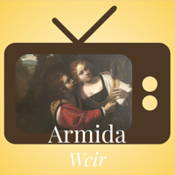
Overview
Synopsis
Judith Weir’s Armida is an updating of the Armida legend to a time recent enough for TV stations and smartphones. Rather than transporting the audience to the crusades in Damascus, it shows them that perhaps we have never left. The International Peacekeeping Force is in a desert war zone, somewhere outside an occupied city in the region of the Southern Sahara. The soldiers have the wrong equipment and the wrong maps, and a Chief-of-Staff who keeps getting things wrong. They are not the attacking force here, but are also not achieving anything by remaining outside the city.
The sorceress Armida is now a TV reporter within the occupied city, and Hidroat is no longer the King of Damascus, but the Director of Metropolis TV. When the officers invite the TV Reporters to visit their camp and do a feature on them, Metropolis TV responds. During an interview, Armida and Rinaldo disappear, but it is not magic this time, merely an explosion and a stolen van. Armida takes Rinaldo to her apartment, and the two of them fall in love over a mutual desire for peace.
Officers Ubaldo and Carlo attempt to rescue Rinaldo from the city, but get distracted from their mission by a tray of colorful drinks offered by the weather girl. Back at the camp, The Chief-of-Staff, Goffredo, is similarly distracted, but this time by planting crops and tending to goats. The war is over, and the world has been transformed. Everyone has found something else they would much rather be doing.
Weir cleverly references both Lully’s opera Armide and Gluck’s later rewriting of the same libretto in her baroque style duets and love scenes, but this opera written for television is a hopeful and refreshing interpretation of the Armida myth.
Show Information
- Music
- Judith Weir
- Libretto
- Judith Weir
- Category
- Opera
- Age Guidance
- Youth (Y)/General Audiences (G)
- Number of Acts
- 2
- First Produced
- 2005
- Genres
- Romance, Satire, Fairy Tale/Fantasy
- Settings
- Contemporary, Multiple Settings
- Time & Place
- An Occupied City, An Army Camp, Southern Sahara, Modern Times
- Cast Size
- medium
- Orchestra Size
- Small
- Dancing
- None
- Licensor
- The Music Sales Group
- Ideal For
- Professional Opera, Mostly Male Cast, College/University, Includes Mature Adult, Adult, Young Adult, Child Characters, Medium Cast
Context
Plot
Characters
| Name | Part Size | Gender | Vocal Part |
|---|---|---|---|
|
Lead |
Male |
Baritone |
|
|
Lead |
Male |
Tenor |
|
|
Lead |
Female |
Mezzo-Soprano |
|
|
Supporting |
Male |
Tenor |
|
|
Supporting |
Male |
Baritone |
|
|
Supporting |
Male |
Bass |
|
|
Supporting |
Female |
Soprano |
|
|
Featured |
Either Gender |
Non-singer |
|
|
Ensemble |
Male |
Tenor, Baritone, Bass |
Songs
Act One
Scene 1 : Overture
Scene 2: In the Army Camp
- ‘Rankadidi!’ - Goffredo, Army
- ‘Dear Mum, It’s not bad where we are’ - Carlo, Army, Goffredo
- ‘Sir! I have to point out’ - Ubaldo, Army, Goffredo
- ‘You know, I went out for a walk today’ - Rinaldo
Scene 3: Metropolis TV
- ‘Will never leave you…’ - Armida, Idraote, Ms Pescado
- ‘Metropolis Weather!’ - Ms Pescado
Scene 4: Army HQ
- ‘Rinaldo! Straight at the camera’ - Carlo, Goffredo, Ubaldo,
- ‘People of the Occupied Zone’ - Rinaldo, Armida, Idraote
Scene 5: In the Metropolis TV Van on the way to the army camp
- ‘Leave town by the south west road’ - Armide, Idraote
Scene 6: Army Camp
- ‘Ah, dinner time’ - Army
- ‘Ah, hello, welcome’ - Goffredo, Ubaldo, Carlo, Armida, Idraote
- ‘Is it worth it?’ - Armida, Ubaldo, Carlo, Goffredo
- ‘Tell me, what is the high and low point?’ - Armida, Rinaldo
- ‘I thought it was gas’ - Ubaldo, Carlo, Goffredo, Idraote, Two Children
Act Two
Scene 7: In the Metropolis TV van on the way back to the city
- ‘Heaven and earth, mountain and desert’ - Ms Pescado, Rinaldo, Armida
Scene 8: At Army HQ, Next Morning
- ‘Sensors?’ - ‘Redundant’ - Ubaldo, Goffredo
- ‘I’ve been haunted’ - Carlo, Idraote, Ubaldo, Goffredo
Scene 9: In a rooftop restaurant overlooking the port
- Baroque Duet: ‘Rinaldo! Why have you left your command?’ - Armida, Rinaldo
Scene 10: In the streets of the city
- ‘Do you think that people can tell’ - Ubaldo, Carlo
Scene 11: On a roof terrace, looking out to sea
- Love Scene: ‘Did you ever think in the whole of your life’ - Armida, Rinaldo, Ms Pescado
Scene 12: In the streets of the city, in the vicinity of Armida’s Apartment
- ‘Rinaldo! What are you wearing’ - Carlo, Ubaldo, Rinaldo
Scene 13: At the Army Camp
- ‘Perennial planting water all around’ - Goffredo, Idroate
Scene 14: Metropolis TV News (And Weather)
Scene 15: Finale
A song with an asterisk (*) before the title indicates a dance number; a character listed in a song with an asterisk (*) by the character's name indicates that the character exclusively serves as a dancer in this song, which is sung by other characters.
Monologues
Scenes
Key Terms
Sorry! We do not currently have terms for this guide.
Videos
Sorry! We do not currently have videos for this guide.
Quizzes
Themes, Symbols & Motifs
Sorry! We do not currently have learning modules for this guide.
Quote Analysis
Sorry! We do not currently have learning modules for this guide.
